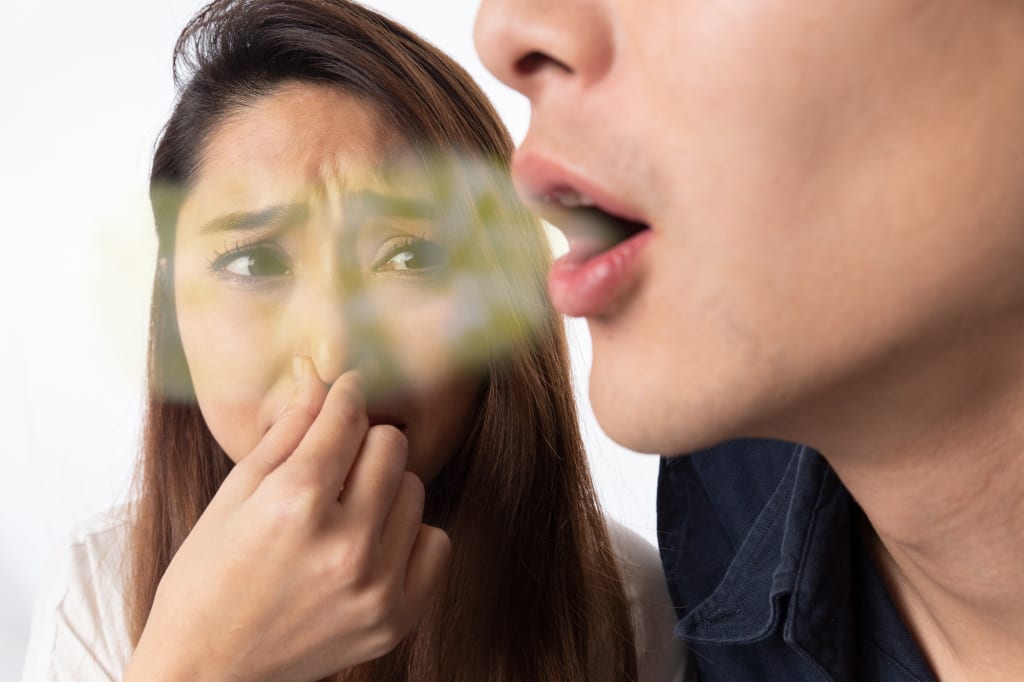What Are Reasons for Bad Breath
Identifying The Causes and Remedies for Halitosis

Bad breath, also known as halitosis, is a common condition that can be caused by a variety of factors. Some of the most common causes of bad breath include the foods we eat, poor oral hygiene, and certain medical conditions. In this article, we will discuss which foods can cause bad breath and how they contribute to this condition.
Garlic and onions:
The first point in the outline about the causes of bad breath is that certain foods can contribute to the condition. One of the most notable examples of this are garlic and onions. These foods contain sulfur compounds that, when broken down in the mouth, can release a strong odor. This odor can linger in the mouth for hours or even days, causing bad breath.
When you consume garlic and onions, the sulfur compounds they contain are broken down by enzymes in the mouth. These compounds then release gases that are responsible for the strong smell. This smell can linger in the mouth and on the breath, even after brushing your teeth.
The problem with garlic and onions is that their odor can be difficult to remove, even with proper oral hygiene practices. Brushing your teeth and using mouthwash can help to some extent, but the smell can still linger. This is because the odor-causing compounds are not just on the surface of the food, but are also absorbed into the bloodstream and exhaled through the lungs.
Another issue with garlic and onions is that they can also irritate the soft tissues in the mouth, such as the gums and tongue. This irritation can lead to an increase in bacteria, which can further contribute to bad breath.
To prevent bad breath caused by garlic and onions, it is best to avoid consuming them in large quantities or to at least brush your teeth and rinse your mouth thoroughly after eating them. Chewing sugar-free gum or mints can also help to freshen your breath.
It's worth noting that garlic and onions have many health benefits so it's not necessary to avoid them altogether. However, it's a good idea to be mindful of their consumption if you're concerned about bad breath.
Dairy products:
Dairy products such as milk and cheese can contribute to bad breath by producing a buildup of bacteria in the mouth.
When we consume dairy products, the sugar and protein found in them can be broken down by bacteria in the mouth. This process produces volatile sulfur compounds (VSCs) which are responsible for bad breath odor. Additionally, if the dairy product isn't well cleaned from the mouth, it can lead to plaque buildup which can also contribute to bad breath.
Another issue with dairy products is that they can also cause dry mouth. Saliva plays a crucial role in keeping the mouth clean and healthy, and a dry mouth can lead to an increase in bacteria, which can further contribute to bad breath.
To prevent bad breath caused by dairy products, it is best to consume them in moderation and to practice good oral hygiene. Brush your teeth and floss regularly, and use a mouthwash to freshen your breath. Drinking water can also help to keep your mouth hydrated and wash away any leftover food particles.
It's also a good idea to be mindful of the types of dairy products consumed, as some are higher in sugar than others, and can contribute more to bad breath. For example, a glass of milk has less sugar than a cup of yogurt.
Meat:
Eating meat, especially red meat, can lead to an increase in bacteria in the mouth and cause bad breath.
Meat is high in protein, which is a favorite food for the bacteria that live in the mouth. When these bacteria break down the protein in meat, they produce volatile sulfur compounds (VSCs) that are responsible for bad breath odor. The breakdown of protein also leads to the release of amino acids, which can also contribute to bad breath.
Another issue with meat is that it can be difficult to clean from the teeth and gums. Meat fibers can get stuck between teeth and in the crevices of the gums, which can provide a breeding ground for bacteria. This can lead to plaque buildup and further contribute to bad breath.
To prevent bad breath caused by meat, it is best to consume it in moderation and to practice good oral hygiene. Brush your teeth and floss regularly, and use a mouthwash to freshen your breath. Drinking water can also help to wash away any leftover food particles.
It's also a good idea to be mindful of the types of meat consumed, as some meats are higher in fat than others and can contribute more to bad breath. For example, a grilled chicken breast has less fat than a prime rib steak.
Spicy foods:
Foods that are high in spices can cause bad breath by increasing the production of stomach acid.
Spicy foods can cause bad breath by triggering acid reflux, a condition in which stomach acid flows back into the esophagus. When this happens, the acid can reach the back of the throat and mouth, where it can cause bad breath. Additionally, spicy foods can also irritate the stomach lining, causing excessive stomach acid production and leading to bad breath.
Another issue with spicy foods is that they can also cause dry mouth. Saliva plays a crucial role in keeping the mouth clean and healthy, and a dry mouth can lead to an increase in bacteria, which can further contribute to bad breath.
To prevent bad breath caused by spicy foods, it is best to consume them in moderation and to practice good oral hygiene. Brush your teeth and floss regularly, and use a mouthwash to freshen your breath. Drinking water can also help to keep your mouth hydrated and wash away any leftover food particles.
Coffee and alcohol:
Both of these can cause dry mouth, which can lead to bad breath.
Coffee and alcohol are both diuretics, which means they can cause an increase in urine production and lead to dehydration. As a result, they can also cause dry mouth, a condition in which the body doesn't produce enough saliva. Saliva plays an important role in keeping the mouth clean and healthy, and a dry mouth can lead to an increase in bacteria, which can further contribute to bad breath.
Another issue with coffee and alcohol is that they can also stain the teeth, which can contribute to bad breath. The staining can provide a breeding ground for bacteria and plaque buildup, which can further contribute to bad breath.
To prevent bad breath caused by coffee and alcohol, it is best to consume them in moderation and to practice good oral hygiene. Brush your teeth and floss regularly, and use a mouthwash to freshen your breath. Drinking water can also help to keep your mouth hydrated and wash away any leftover food particles.
It's also a good idea to limit the consumption of coffee and alcohol before bedtime, as sleeping with a dry mouth can exacerbate bad breath.
Sugar and sugary foods:
Eating sugary foods can lead to an increase in bacteria in the mouth, which can cause bad breath.
Sugar is a favorite food for the bacteria that live in the mouth. When these bacteria consume sugar, they produce volatile sulfur compounds (VSCs) that are responsible for bad breath odor. Additionally, when sugar is consumed in high amounts, it can lead to the formation of plaque on the teeth, which can also contribute to bad breath.
Another issue with sugary foods is that they can also cause dry mouth. Saliva plays a crucial role in keeping the mouth clean and healthy, and a dry mouth can lead to an increase in bacteria, which can further contribute to bad breath.
To prevent bad breath caused by sugary foods, it is best to consume them in moderation and to practice good oral hygiene. Brush your teeth and floss regularly, and use a mouthwash to freshen your breath. Drinking water can also help to keep your mouth hydrated and wash away any leftover food particles.
It's also a good idea to be mindful of the types of sugary foods consumed, as some are stickier than others and can contribute more to bad breath. For example, candy is stickier than a piece of fruit, and can adhere to teeth more easily.
Smoking and chewing tobacco:
These habits can cause bad breath as well as other oral health problems.
Smoking and chewing tobacco can cause bad breath by drying out the mouth, which can lead to an increase in bacteria. The smoke and chemicals in tobacco products can also irritate the soft tissues in the mouth, such as the gums and tongue, leading to inflammation and bad breath.
Additionally, smoking and chewing tobacco can also lead to discoloration and staining of the teeth, which can provide a breeding ground for bacteria and plaque buildup, further contributing to bad breath.
Furthermore, these habits can also lead to other oral health problems, such as tooth decay, gum disease, and even oral cancer. These health issues can lead to chronic bad breath and can have a significant impact on overall health.
To prevent bad breath caused by smoking and chewing tobacco, it is best to quit these habits altogether. Quitting smoking and chewing tobacco can also greatly improve overall health. If you are having trouble quitting, there are many resources available to help you, such as nicotine replacement therapy and counseling.
Some Medications:
Dry mouth, which can result from several drugs, can contribute to poor breath.
Dry mouth, also known as xerostomia, is a common side effect of many medications, particularly those that are used to treat conditions such as high blood pressure, depression, and anxiety. When the mouth is dry, it doesn't produce enough saliva, which plays a crucial role in keeping the mouth clean and healthy. A dry mouth can lead to an increase in bacteria, which can further contribute to bad breath.
Additionally, some medications can also lead to changes in the pH levels of the mouth, which can also contribute to bad breath.
To prevent bad breath caused by certain medications, it is best to talk to your doctor or pharmacist about the side effects of the medications you are taking and if there are any alternative options available. Drinking water can also help to keep your mouth hydrated and wash away any leftover food particles. Using a saliva substitute or a saliva-stimulating medication can also be helpful to increase the flow of saliva in the mouth.
Some medical conditions:
Certain medical conditions can cause bad breath as a symptom or as a side effect of treatment.
One example of a medical condition that can cause bad breath is diabetes. High blood sugar levels associated with diabetes can lead to an increase in bacteria in the mouth, which can cause bad breath. Additionally, diabetes can also lead to dry mouth, which can further contribute to bad breath.
Another example is sinusitis and post nasal drip, which can cause bad breath as mucus from the nasal cavity drips down to the back of the throat and mixes with bacteria, leading to bad breath.
Gastroesophageal reflux disease (GERD) is another common condition that can cause bad breath. This condition occurs when stomach acid flows back into the esophagus, and can cause bad breath by introducing acid and other stomach contents into the mouth.
Lastly, certain medications that are used to treat these conditions can also cause dry mouth, which can lead to bad breath.
To prevent bad breath caused by certain medical conditions, it is important to consult a healthcare professional to determine the best course of treatment. In some cases, bad breath may be an early symptom of a medical condition, and addressing the underlying condition can help to improve bad breath.
Poor oral hygiene:
A lack of proper oral hygiene can lead to an increase in bacteria in the mouth, which can cause bad breath.
Brushing and flossing teeth regularly, as well as using mouthwash, are essential for maintaining good oral hygiene and preventing bad breath. When plaque and bacteria build up on the teeth and gums, it can lead to bad breath and other oral health problems.
Additionally, not cleaning dentures, retainers, or other dental appliances properly can also lead to bad breath as it can trap bacteria and food particles.
To prevent bad breath caused by poor oral hygiene, it is important to brush your teeth at least twice a day and floss at least once a day. Using a mouthwash can also help to freshen your breath and kill bacteria. Cleaning dentures, retainers, and other dental appliances properly and regularly can also help to prevent bad breath.
It's also important to schedule regular dental checkups and cleanings, as a dentist or hygienist can remove plaque and tartar buildup that cannot be removed by brushing and flossing alone.
achieve ultra-fresh breath in just a few days!, LEARN MORE about It
Bad breath can be caused by a variety of factors, and the foods we eat are one of the most common causes. Foods such as garlic, onions, dairy products, meat, and sugary foods can all lead to an increase in bacteria in the mouth, which can cause bad breath. In addition, habits such as smoking and chewing tobacco, as well as certain medical conditions, can also contribute to bad breath. To prevent bad breath, it is important to practice good oral hygiene and to be mindful of the foods we eat. If you are experiencing persistent bad breath, it is important to consult a healthcare professional to rule out any underlying medical conditions.
About the Creator
Enjoyed the story? Support the Creator.
Subscribe for free to receive all their stories in your feed. You could also pledge your support or give them a one-off tip, letting them know you appreciate their work.






Comments
There are no comments for this story
Be the first to respond and start the conversation.